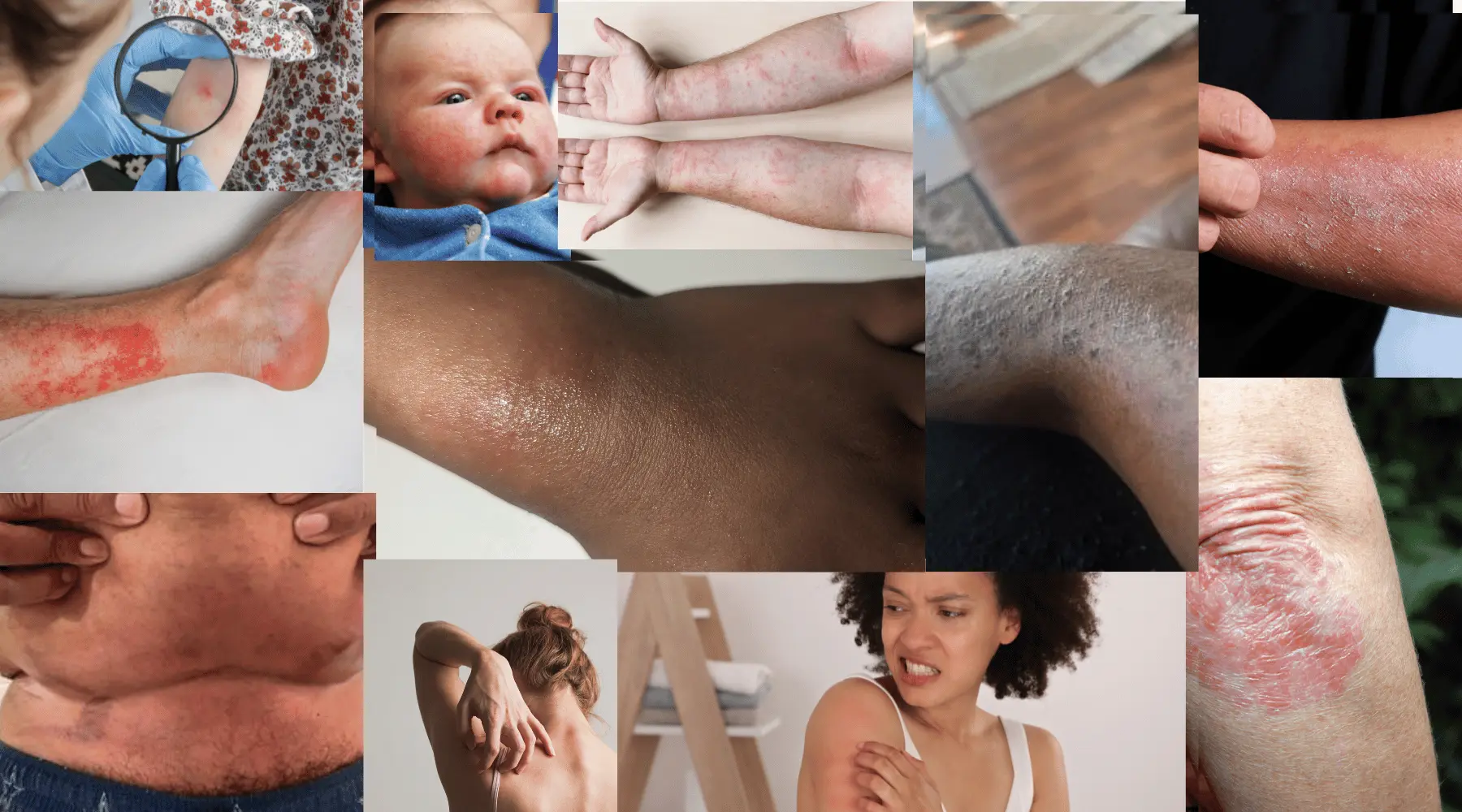Easy-to-Read Guide to Atopic Dermatitis & Eczema
Table of Contents
- What Is Eczema?
- Are Certain Races & Ethnicities More Likely to Develop Eczema?
- What Are the Different Types of Eczema?
- What Causes Atopic Dermatitis Eczema?
- When Do Atopic Dermatitis Eczema Symptoms Begin?
- What Is an Eczema Flare-Up or Eczema Rash?
- How Is Eczema Diagnosed?
- Understanding and Managing Your Atopic Dermatitis Triggers
- Prevent Eczema Flare-Ups with Natural Creams & Remedies
- Contact Butter by Q
When our infant daughter, Ella, was diagnosed with eczema or atopic dermatitis, several questions flooded our minds and our Google search bar:
- What causes eczema or atopic dermatitis?
- Can you get eczema on the face?
- How to get rid of eczema?
- Are eczema and atopic dermatitis the same thing?
- Is eczema contagious?
After trying prescription steroid eczema creams that bleached her skin, eczema creams that stung, and atopic dermatitis creams that did nothing, we were discouraged — to say the least. To make matters worse, many of the “natural” products were filled with artificial dyes and perfumes, which seemed to cause more irritation and inflammation.
Driven by a mother’s love and months of research, we combined a distinct group of all-natural, plant-based ingredients scientifically believed to help eczema. We created the first Butter by Q product — Eczema Balm. Safe and effective, the Eczema Balm helped soften, nourish, repair, and protect our daughter’s skin from eczema. More so, our Eczema Balm helped reduce flare-ups and keep them at bay.
While our Eczema Balm and Whipped Shea Butter are integral parts of her treatment plan, understanding her eczema — atopic dermatitis eczema — was paramount. To help you along your journey, we’ve outlined some of the most pertinent and relevant information about atopic dermatitis and eczema. Let’s take a closer look at atopic dermatitis.
What Is Eczema?

Impacting 31.6 million people in the United States, eczema is an umbrella term used to categorize conditions that cause skin inflammation and irritation. Eczema is noncontagious and can cause several painful symptoms, such as:
- Rashes,
- Dry skin,
- Itchiness,
- Scaly patches,
- Eczema rashes,
- Skin infections, and
- Blisters.
Severe eczema may also be characterized by oozing. Although eczema is often discussed as a singular condition, there are many forms of eczema.
Atopic Dermatitis Is the Most Common Form of Eczema

Atopic dermatitis is the most common type of eczema. This type of eczema is triggered by an overactive immune system that prompts your skin barrier to become itchy and dry. Whenever an allergen or irritant from inside or outside the body triggers the immune system, it results in inflammation or what is called an eczema flare-up on the skin’s surface. Because of its prevalence, most people refer to atopic dermatitis as eczema. But atopic dermatitis is one form of eczema.
Eczema Can Occur Anywhere on the Body
Eczema or atopic dermatitis flare-ups can occur in all parts of the body, including
- Eczema on the legs
- Eczema on the face
- Hand eczema
- Elbow eczema
- Eczema behind the ears on
- Eczema around the eyes
Areas with creases of skin — such as lower legs, elbows, and knees — can rub against to cause even more irritation.
Each Individual Can Have Different Eczema Triggers

Eczema tends to come and go over periods of time. It can be made worse by exposure to certain things, especially allergens like dust mites and pet dander. What’s more confusing about eczema is that triggers can vary from person to person. Some of the most common eczema triggers include:
- Detergents
- Lotions with heavy fragrances
- Cosmetics
- Soaps
- Certain foods
- Certain cleaning products
For some people, seasonal changes can exasperate eczema, while others may experience eczema flare-ups because of stress or illness.
Is Eczema Contagious?
Eczema is not a contagious condition. Even if you or a loved one have an active rash, it can’t be passed on to someone else. Simply put, eczema will not rub off onto someone else.
Is Eczema or Atopic Dermatitis an Autoimmune Disease
While eczema shares several characteristics with autoimmune diseases, it doesn’t classify as an autoimmune condition. However, the immune system is involved in eczema flare-ups, which means medications that target the immune system may be helpful.
What Does Eczema Look and Feel Like?

Eczema can change the feel and look of your or your loved one’s skin. Many people describe their eczema as a raised, bumpy, or blotchy rash. In addition, eczema can appear differently based on your skin tone:
- Eczema may cause the skin appear dusty or ashy on Black people and those with darker skin tones. Atopic dermatitis can also appear as small bumps on the legs, arms, and torso.
- Eczema lead to paler skin tones appear red.
The body part impacted by the flare-up can also dictate how it looks. For instance, if you have eczema around the eyes or eczema on the eyelids, it can appear swollen. No matter the location, eczema tends to make the skin extremely dry and rough, similar to sandpaper, which can lead to splitting or cracking.
Are Certain Races & Ethnicities More Likely to Develop Eczema?

According to the National Eczema Association, 10% of the population will develop eczema over the course of life. Anyone can be impacted by eczema.
- 10% of Black people will develop eczema
- 11% of White people will develop eczema
- 13% of Native American people will develop eczema
- 13% of Pacific Islander or Asian people will develop eczema
What Are the Different Types of Eczema?
As previously mentioned, atopic dermatitis is the most common form of the condition, impacting an estimated 16.5 million adults. Atopic dermatitis occurs when the skin’s natural barrier is weakened and has a reduced ability to protect itself from the elements, irritants, and allergies. The most common types of eczema are briefly explained below:
- Contact dermatitis is when you experience a skin rash or irritated skin because of contact with a certain substance or environmental factor.
- Dyshidrotic eczema (pompholyx) causes extremely itchy and small blisters often found on the toes, fingers, palms, and soles of the feet.
- Nummular eczema involves tiny, coin-shaped, blister-like, reddish spots and sores often caused by an insect bite, burn, or abrasion.
- Seborrheic dermatitis is a type of eczema that can produce dandruff-like flakes. One form of seborrheic dermatitis is cradle cap.
- Stasis dermatitis causes skin inflammation in the lower legs from fluid buildup and poor circulation.
- Dermatitis herpetiformis (DH) is an intensely itchy, chronic, blistering skin rash caused by gluten sensitivity.
What Causes Eczema or Atopic Dermatitis?

The exact cause of atopic dermatitis is unknown. Researchers have, however, discovered connections and interactions between environmental triggers and genetics. Specifically, atopic dermatitis is a part of the Atopic Triad, which are three related conditions.
The Atopic Triad: Asthma, Allergies & Eczema

The Atopic Triad refers to the occurrence of these three conditions together:
- Asthma
- Eczema
- Allergies
The Atopic Triad usually starts with eczema. It’s then followed by food allergies and the development of asthma and allergic rhinitis, respectively. The relationship between asthma and eczema has been well documented across several research papers and studies:
- Based on a 2018 research paper, 20% of kids with mild eczema developed asthma. And 60% of children with severe eczema developed asthma.
- Another study conducted in 2021 connected eczema with the development of peanut allergies, especially if the eczema is severe.
Eczema Can Be Genetic
Researchers also believe there is a genetic component to eczema involving the protein “filaggrin.” This protein is tasked with helping your skin retain moisture. Filaggrin deficiencies can cause itchier, drier skin.
Eczema Can Be Hereditary
If you have a family member who has atopic dermatitis or other types of eczema, asthma, or allergies, you could be at increased risk. According to a 2015 study, the chance of inheriting atopic dermatitis is around 75% when it’s in your family.
When Do Atopic Dermatitis Eczema Symptoms Begin?

Atopic dermatitis symptoms can start at any time — whether it’s adulthood, adolescence, or childhood. The severity of your eczema can range from mild to severe.
When Does Baby Eczema Start?
Newborn babies can develop and experience eczema symptoms within their first weeks and months of life. Atopic dermatitis affects up to 25% of children and an estimated 60% of those with eczema develop the condition during their first year of life.
Young children with eczema may have extremely dry patches of skin. These dry patches of skin can be itchy and cause blisters as well as skin infections — due to the continual scratching.
Can Adults Develop Eczema?
Contrary to popular belief, adults can develop eczema. Adults tend to develop eczema on different parts of their bodies than children, such as:
- Crooks of elbows
- Backs of knees
- Face
- Back of neck
Adults may be especially prone to develop eczema around their eyes, which causes darker, thickened skin.
What Is an Eczema Flare Up or Eczema Rash?

Many people use the term “flare-up” to explain when they’re experiencing one or more than one symptoms or side effects associated with their eczema, such as:
- Red, itchy eczema rash
- Prolonged itchiness
- Inflamed reddish brown or gray patches of skin
- Dry skin that becomes raw or swollen from scratching
- Skin that thickens and cracks
- Tiny raised bumps that can leak fluid or crust
The symptoms associated with an eczema flare-up may come and go. Some people experience eczema flare-ups after eating certain foods, such as tetrazine or Yellow Dye #5, or after touching certain items, fragrances, etc.
How Is Eczema Diagnosed?

Unfortunately, eczema isn’t always easy to diagnose. This is largely due to the lack of a singular test designed to diagnose atopic dermatitis. Instead, certain criteria must be met for a physician to make a definitive diagnosis. After reviewing your family and medical history coupled with an examination, your physician should be able to make a diagnosis with relative confidence.
Patch Testing Can Be Used to Identify Potential Eczema Triggers

Patch testing is a simple, non-invasive test that can help determine whether your skin reacts to certain substances. This test can be very useful in diagnosing contact dermatitis as well as differentiating between atopic dermatitis and contact dermatitis. Patch testing can help you learn potential triggers, so you can prevent future symptoms.
Understanding & Managing Your Eczema & Atopic Dermatitis Triggers
When it comes to treating eczema, there are no one-size-fits-all solutions. What works well for one person may be useless for you. As such, it’s best to work with your doctor to understand your eczema trigger foods, substances, and skin irritants. Some of the most common eczema triggers are explained below.
What Foods Trigger Eczema Flare-Ups?

You know the old saying…"you are what you eat?" The stakes are elevated when you have eczema. Some of the most common eczema-trigger foods:
- Eggs
- Cow's milk
- Gluten
- Soy products
- Nuts
- Fish
- Citrus fruit
- Tomatoes
- Certain nuts
If you suspect or believe a certain food is triggering your eczema, consider the elimination diet. The elimination diet involves strategically removing certain foods believed to cause allergies and eczema breakouts.
Artificial Dyes Can Be Atopic Dermatitis Triggers, Especially Yellow #5
Food dye is an artificial substance added to food products to make them look more desirable. And one popular food dye is Yellow 5 — also referred to as tartrazine.
Yellow 5 can be used as a standalone dye or mixed with other dyes to create additional colors. This common food dye boasts a lemon-colored, bright yellow hue and is used in products, such as:
- Sodas
- Cereals
- Candy
- Frosting
- Gelatins
- Sauces
- Spices
- Juices
- Yogurt
In addition, Yellow 5 dye is often found in cosmetic products, drugs, and even paint, such as
- Toothpaste
- Mouthwash
- Lipsticks
- Shampoos
- Detergents
- And more
Unfortunately, this widely-used food dye is associated with triggering eczema flare-ups. In fact, one study on kids aged from 1 to 6 revealed food dyes worsened eczema symptoms in one out of 12 people. The message is simple: make sure you read labels and closely monitor the foods you or your child consume.
Certain Cosmetic Perfumes & Artificial Fragrances Can Be Triggers
Everyone likes to smell good, but the cost of cotton candy-scented body butter can be significant for those with eczema and sensitive skin. Simply put, any product with synthetic fragrance or perfume is likely to trigger your eczema. Synthetic fragrances can be especially problematic for those with atopic dermatitis.
Treat Eczema Naturally By Avoiding Known Environmental Triggers
In addition to what you eat and put on your skin, there are many environmental triggers you should be aware of.
- Getting too cold or too hot
- Extended exposure to water
- Exposure to extreme water temperatures
- Sweating and quickly becoming chilled
- Living in a dry climate
- House dust mites
- Pollen, pet fur, and molds
- And more
Is Stress-Induced Eczema a Real Thing?
Stress and anxiety are common triggers that can cause your eczema to flare up. As a vicious cycle, eczema flare-ups cause more stress and anxiety, which can trigger even more flare-ups. Here’s why: your body produces more of the stress hormone, cortisol, whenever you are under pressure or stressed. The overproduction of cortisol can cause your skin to become abnormally oily and trigger your eczema flare-up.
According to one study, stress can also make it more difficult for your skin to recover from damage and irritation. As a result, stress doesn’t just cause eczema flare-ups — it can make the flare-ups last longer, which further adds to the stress and eczema cycle.
Prevent Eczema Flare-Ups with Natural Eczema Creams & Remedies

With atopic dermatitis, a weakened skin barrier makes it more difficult for your skin to retain moisture, causing dry and itchy skin. This faulty skin barrier makes it more prone to bacteria, allergens, and other invaders. That’s why keeping your skin well moisturized with humectants, occlusives, and emollients is key:
- Humectants are hygroscopic substances designed to keep your skin moist by attracting and retaining moisture.
- Occlusive ingredients provide a protective seal over your skin's surface to prevent the loss of moisture to the environment. Occlusives also help prevent allergens, irritants, and other harmful substances from entering your skin.
- Emollients are substances that smooth the skin by filling in the cracks between your cells.
And, as usual, Mother...Nature knows best. Shea butter, mango butter, jojoba oil, rosehip oil, and apricot kernel oil are among the top natural, plant-based moisturizers that check every box and more.
Use Natural Eczema Creams with Shea Butter
Shea butter is a spectacular option and natural remedy for eczema because it is a humectant, emollient, and occlusive. Extracted from the powerful kernels of a shea tree, shea butter has amazing moisturizing and anti-inflammatory properties that can help ease eczema.
Mango Butter Acts as a Natural Eczema Remedy
Similar to shea butter, mango butter is rich in compounds that reduce skin inflammation. It's full of vitamins that promote healthy skin reproduction. It also has anti-microbial properties, which can help those suffering from eczema.
Use Products with Jojoba Oil as a Natural Eczema Remedy
According to the National Eczema Association, jojoba oil has been studied and shows promising results for eczema. This premium oil doubles as a humectant while offering healing and anti-inflammatory properties.
Jojoba oil is an all-natural, go-to solution for relieving itchy, flaky, dry, and inflamed eczema-riddled skin. Unlike water-based moisturizers, jojoba oil provides a long-lasting layer of protection for your skin without the greasy feeling.
Use Eczema Creams with Rosehip Oil to Alleviate Symptoms
Rosehip Oil is loaded with two key essential components that help with dermatitis and eczema:
- Essential Fatty Acids Omega 3 and 6. Since your body can't produce Omega 3 and 6, you must rely on external nutrients, like Rosehip Oil, to help maintain the right level. The high fatty acid content creates a fine film over the skin's surface to hold in moisture and prevent it from becoming scaly and dehydrated.
- Vitamin A. This nutrient produces retinol which helps stimulate collagen production to boost the skin's quality and elasticity.
Apricot Kernel Oil Can Act as Natural Eczema Relief
Apricot kernel oil works to expedite the healing of wounds, protect the skin against bacteria and toxins, and lighten unwanted blemishes. It's rich in Vitamin E, and fatty acids, and has anti-inflammatory properties, which makes apricot kernel oil an excellent skin rejuvenator. It also offers anti-inflammatory properties and can help fight acne-causing bacteria.
Consider Eczema Creams with Certain Essential Oils to Alleviate Eczema Symptoms
While artificial fragrances can be hazardous to those with eczema, certain essential oils can have beneficial effects. First things first, you should never apply any undiluted essential oil to your skin —whether you have eczema or not.
Instead, when the essential oil is properly diluted with a carrier oil, it can offer a full range of benefits for eczema and atopic dermatitis. In fact, essential oils have been utilized to treat eczema for hundreds of years. Certain essential oils are known to have antimicrobial and anti-inflammatory effects that can help ease eczema symptoms. Examples of these essential oils include:
- Lavender
- Chamomile
- Geranium
- Frankincense
- Eucalyptus
- Cedarwood
- Peppermint
In the end, Mother Nature offers a plethora of natural solutions designed to help alleviate, restore, and nourish dry, eczema skin.
Make Sure to Apply Natural Moisturizers Properly

To maximize the effectiveness of your natural or conventional moisturizer, it’s imperative to apply it the right way. According to the American Academy of Dermatology, applying a moisturizer after a bath or when the skin is damp is key because it creates an artificial barrier. The barrier helps keep out bacteria, viruses, and irritants that can cause inflammation while preventing the loss of water.
Shop Butter by Q Products — Pure Ingredients. Pure Results
If you have eczema or sensitive skin, finding a safe and natural solution that works can be a challenge. And this is exactly why we started Butter by Q. We're proud to offer handcrafted, plant-based, all-natural Eczema Balm and many other hair and body products.
While the product name can change, our dedication to using the best and most premium ingredients Mother Nature has to offer remains the same. We skip preservatives, synthetic dyes, artificial fragrances, and any other potentially harmful substance. Instead, we only use Pure Ingredients to deliver Pure Results. We feel good about every ingredient we put into our products, so you can feel even better when you put it on.









